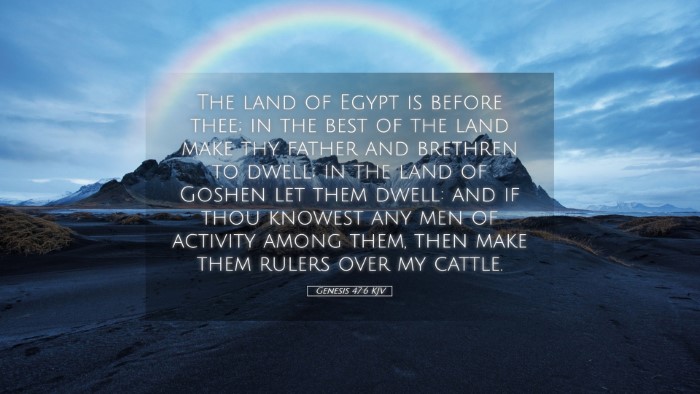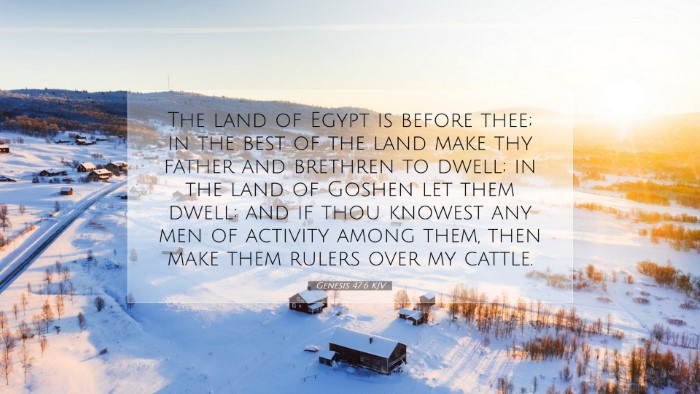Commentary on Genesis 47:6
Verse (Genesis 47:6): "The land of Egypt is before you: in the best of the land make your father and brethren to dwell; in the land of Goshen let them dwell: and if thou knowest any men of activity among them, then make them rulers over my cattle."
Introduction
This verse comes at a pivotal moment in the narrative of Joseph and his family. As Joseph reveals his identity to his brothers and regains his family, he secures a prosperous future for them in Egypt. The verses not only depict Joseph's love for his family but also his wisdom in assigning them a place of honor and responsibility. Such themes are crucial for pastors, students, theologians, and Bible scholars exploring familial relationships, divine providence, and leadership.
Contextual Background
In the broader context of Genesis, this chapter marks the culmination of Joseph's rise to power and the reunion with his family after years of separation. The earlier chapters provide a backdrop of jealousy, betrayal, and eventual reconciliation. Joseph, having interpreted Pharaoh's dreams and saved Egypt from famine, stands in a position to care for his family. This historical context is significant for understanding both the practicality and spiritual implications of the verse.
Theological Insights
- Divine Providence: Joseph's actions exemplify God's providence. He not only provides for his immediate family but sets a structure wherein they can thrive. This reflects the broader biblical theme that God works through human actions for His divine purposes.
- Family and Community: The instruction to settle in the land of Goshen highlights the importance of family unity and community. In a time of distress, Joseph prioritizes the welfare of his kin, which is a common biblical principle.
- Leadership and Responsibility: Joseph's mention of appointing capable men over his livestock indicates a clear vision for organization and leadership. This aspect of delegation resonates with Timothy's exhortations regarding church leadership in the New Testament.
Commentary from Historical Perspectives
Matthew Henry
Matthew Henry's Commentary emphasizes Joseph's benevolent heart and his managerial skills. He notes that the choice of Goshen as the dwelling place for his family indicates a strategic decision, granting them a fertile land conducive to pastoral life, which was significant for their livelihood. Henry points out that this gesture not only reflects Joseph's reconnection with his roots but also the providential care of God over His people.
Albert Barnes
In Barnes' Notes on the Bible, the focus is on the phrase "men of activity." Barnes interprets this as a call for capable and industrious individuals to take leadership roles, reinforcing the importance of competency and diligence in leadership. He suggests that this selection process by Joseph sets a standard for leadership within the church and suggests a response to God's provision. Furthermore, the choice of Goshen serves a dual purpose: providing for his family and ensuring they remain distinct in a foreign land.
Adam Clarke
Adam Clarke's Commentary offers insights on the cultural implications of Joseph's directives. Clarke recognizes Goshen to be strategically placed, likely to provide his family with the best opportunities while maintaining their identity as pastoral people. He agrees with the thematic focus on leadership and further expounds on the economic implications of the brothers’ involvement in Joseph's business operations. Clarke's analysis signals a nuanced understanding of how God intertwines individual talents with overarching divine plans.
Practical Applications
- Fostering Family Unity: This verse challenges readers to prioritize familial bonds and promote the well-being of relatives, especially during challenging times.
- Emphasizing Leadership in Service: The significance of identifying capable leaders can be the foundation of church governance and community services, which parallels contemporary discussions about church structure and leadership.
- Trusting in Divine Provision: This passage can remind believers of the importance of trusting in God's provision, reflecting on how God orchestrates circumstances for the greater good.
Conclusion
The depth of Genesis 47:6 unfolds numerous themes of God’s unwavering providence, familial love, and the essence of effective leadership. The combined insights of respected commentators—Matthew Henry, Albert Barnes, and Adam Clarke—offer rich theological and practical applications for today's readers. Understanding this scripture within its historical context not only enhances its meaning but also encourages believers to emulate Joseph's characteristics in their spiritual journeys.


